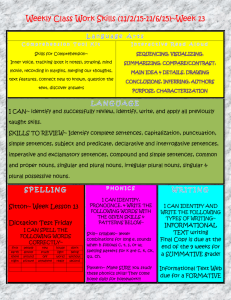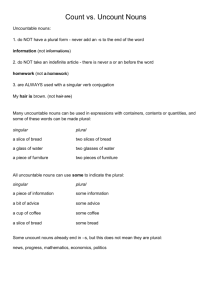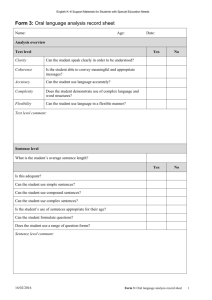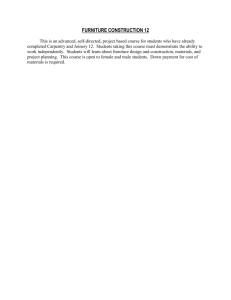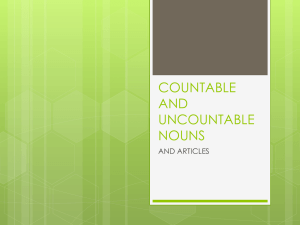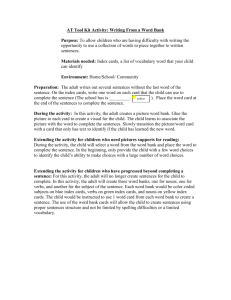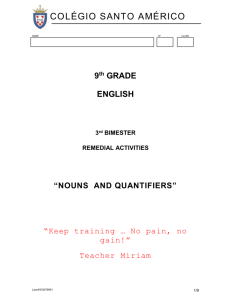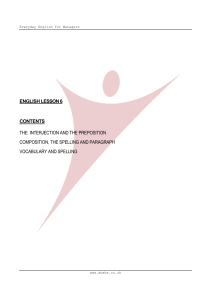Some and zero article with plural and
advertisement
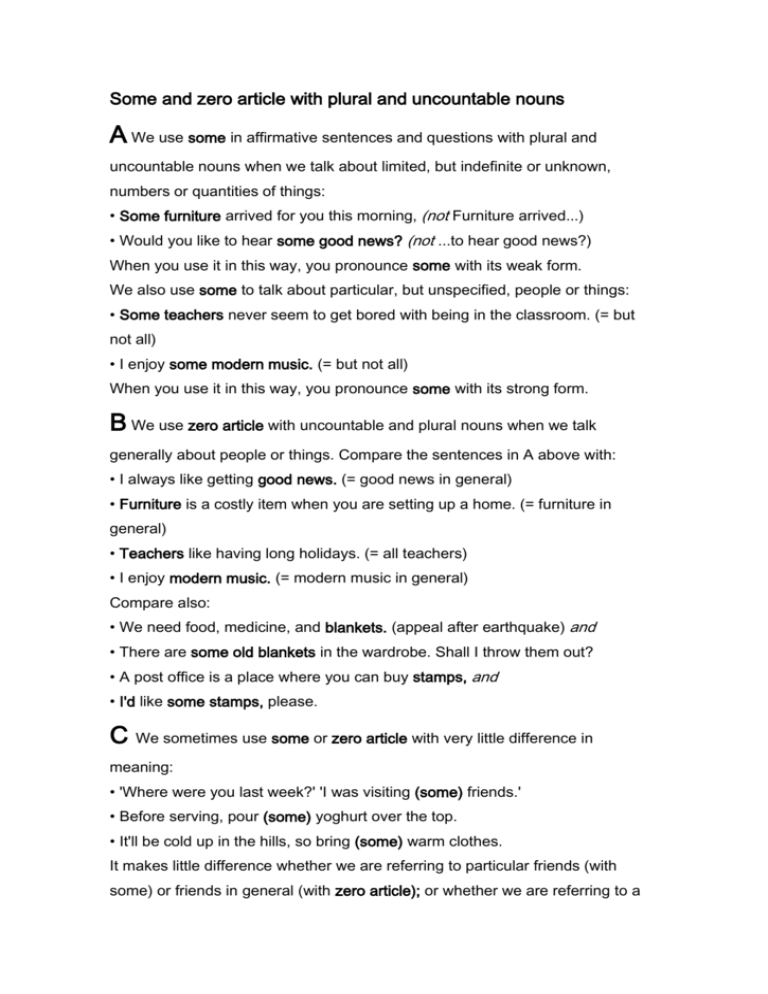
Some and zero article with plural and uncountable nouns A We use some in affirmative sentences and questions with plural and uncountable nouns when we talk about limited, but indefinite or unknown, numbers or quantities of things: • Some furniture arrived for you this morning, (not Furniture arrived...) • Would you like to hear some good news? (not ...to hear good news?) When you use it in this way, you pronounce some with its weak form. We also use some to talk about particular, but unspecified, people or things: • Some teachers never seem to get bored with being in the classroom. (= but not all) • I enjoy some modern music. (= but not all) When you use it in this way, you pronounce some with its strong form. B We use zero article with uncountable and plural nouns when we talk generally about people or things. Compare the sentences in A above with: • I always like getting good news. (= good news in general) • Furniture is a costly item when you are setting up a home. (= furniture in general) • Teachers like having long holidays. (= all teachers) • I enjoy modern music. (= modern music in general) Compare also: • We need food, medicine, and blankets. (appeal after earthquake) and • There are some old blankets in the wardrobe. Shall I throw them out? • A post office is a place where you can buy stamps, and • I'd like some stamps, please. C We sometimes use some or zero article with very little difference in meaning: • 'Where were you last week?' 'I was visiting (some) friends.' • Before serving, pour (some) yoghurt over the top. • It'll be cold up in the hills, so bring (some) warm clothes. It makes little difference whether we are referring to particular friends (with some) or friends in general (with zero article); or whether we are referring to a limited but indefinite amount of yoghurt (with some) or yoghurt in general (with zero article). D Some is used before a number to mean 'approximately': • Some 80% of all those eligible took part in the vote. (= approximately 80%) • There were some 20,000 people at the protest march. (= approximately 20,000) When it is used in this way, some is pronounced in its strong form E When we want to emphasise that we can't say exactly which person or thing we are talking about because we don't know or can't remember, we can use some instead of a/an with a singular noun. When it is used in this way, some is pronounced weak • I was asked a really difficult question by some student in class two. We use the phrase some (thing) or other in a similar way: • I bought them from some shop or other in the High Street, (not ...from a shop or other...) EXERCISES 1 Put some in the spaces where necessary. If no word is needed, write -. (A, B & E) 1 I read about his death in The Post, but newspapers didn't report it at all. 2 My uncle bought valuable new stamps for his collection. 3 It is now known that cigarettes can seriously damage your health. 4 Don't disturb me. I've got really difficult homework to do. 5 I know that parents work so hard they don't have time to talk to their children, but Roy and Amy aren't like that. 6 My hobby is making candles. 7 As we all know, air is lighter than water. 8 Did you hear that monkeys escaped from the zoo last night? 9 I prefer cooking with oil, as it's better for you than butter. 10 We first met in restaurant in London, but I can't remember what it was called. 11 Although most left early, students stayed to the end of the talk. 12 I don't think I've ever met a child who doesn't like chips. Look again at the sentences where you have written some. If these were spoken, which would have the strong form of some and which the weak form ? 2 Add some to these sentences where necessary, or put a √ if they are already correct. (A & B) 1 Can you smell gas? 2 Medicines can be taken quite harmlessly in large doses. 3 I can't drink milk. It makes me feel ill. 4 Water is a valuable commodity. Don't waste it! 5 You should always keep medicines away from children. 6 Do you like my new shirt? It's made of silk. 7 'I'm really thirsty.' 'Would you like water?' 8 There are people here to see you. 9 Books for young children are rather violent and not suitable for them at all. 3 Decide whether the following phrases mean approximately the same thing (write samej, or mean something different (write different,). (A, B & C) 1 I bought some oranges I oranges, but forgot to get the apples you asked for. 2 Some sports clubs I Sports clubs do not allow women members. 3 There are some examples I examples of this on the next page. 4 Some wild animals I Wild animals make very good pets. 5 Some metal alloys I Metal alloys made nowadays are almost as hard as diamond. 4 Write four sentences about your country using some to mean 'approximately'. (D) Example: Some 10 per cent of the population goes (or go) to University. 1 2 3 4 KEY 1 1 some (strong) 2 some (weak) 34 some (weak) 5 some (strong) 678 some (weak) 9-;10 some (strong) 11 some (strong) 12 – 2 1/ 2 Some medicines 3/ 4/ 5/ 6/ 7 some water 8 some people 9 Some books 3 1 same 2 different 3 same 4 different 5 different

